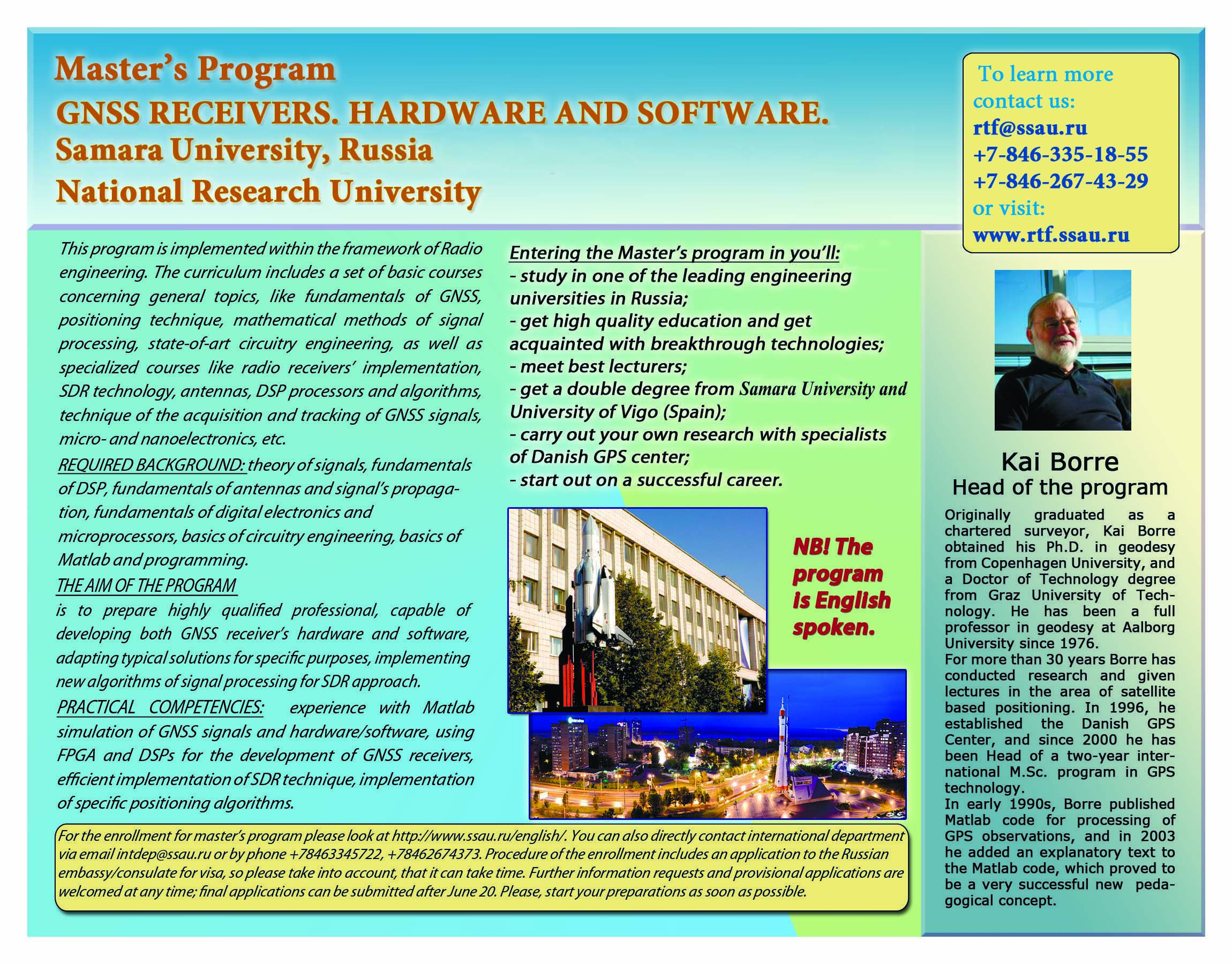11.04.01 «Radio Engineering»
Graduate qualification: master
Graduate : Department of Radio Engineering
The names of master's programs:
The program aims to develop and promote modern high technologies in the field of modern effective means of control (sensing) parameters based on the earth's surface spacecraft. The focus is on the creation of instruments and systems for the control of process equipment in the production and operation of aerospace products. (continue..)
- training of masters in the direction of "Radio", able to carry out scientific research; formulate and solve complex scientific and technical problems;
- building skills collective project work focused on obtaining new results;
- the use of advanced micro and nano-electronics achievements and other advanced technologies.
The program is designed to address the academic council of the university master's degree program at the Faculty of Radio Engineering. Graduate Departments of this master's program is the Department of Radio Engineering.
The main disciplines that define the theme training program:
- The theory and technology of radar and radio navigation;
- Radio systems of information transmission;
- Design of microprocessor devices;
- Radio navigation and radar systems;
- The devices transmit and receive data;
- Radio system;
- Digital data transmission system;
- Optical device radio systems;
- Laser information systems.
Features of the master's program:
- The annual scientific seminar for undergraduates in the form of an international summer school space "Advanced space technology and experiments in space" with the participation of famous scientists and astronauts.
- Engaging lectures scientists of the Russian Academy of Sciences and leading specialists of space industry and telecommunications.
- Conduct training (Research Practice) on the basis of leading foreign and the Patriotic-governmental universities and research institutions with the prospect of double diplomas.
- Participation of each of a student in actual research projects, including international ones, in the field of instrumentation and control systems of technological equipment in the production and exploitation of aerospace products.
- Participation in scientific conferences, seminars and symposiums.
- Work on high-tech equipment, the use of modern software packages OrCAD, MatLab, Altium Designer, etc.
The training used equipment and training materials produced and developed under the national project "Education" program of the National Inves-dovatelskogo University, including:
- Laboratory of radio receivers;
- Laboratory of digital and analog electronics;
- Laboratory of transducers and sensors;
- Small businesses - production cooperative "Electronic Diagnostics, Inc." Innosvet ";
- Student Design Bureau of electronic systems.
As part of the master's programcollaborates with enterprises аэрокосмического профиля:
- FSUE "NII" Screen "(Samara);
- FSUE GNPRKTs "Samara Space Center" (Samara);
- FSUE RHCs them. MV Khrunichev (Moscow);
- Company "Sukhoi" (Moscow);
- LLC "Mikroninter" (Moscow);
- Company PMZ "Voskhod" (Mr. Pavlovsky on Oka);
- "Volga-Dnepr";
- LLC "Flight" (Ulyanovsk).
- Antenna systems and devices
- GNSS receivers. Hardware and software
This program is implemented within the framework of radio engineering. The curriculum includes a set of basic courses concerning general topics, like fundamentals of GNSS, positioning technique, mathematical methods of signal processing, state-of-art circuitry engineering, as well as specialized courses like radio receivers’ implementation, SDR technology, antennas, DSP processors and algorithms, technique of the acquisition and tracking of GNSS signals, micro- and nanoelectronics, etc.(continue..)
The aim of the program is to prepare highly qualified professional, capable to develop both GNSS receiver’s hardware and software, adapt typical solutions for specific purposes, to implement new algorithms of signal processing for SDR approach. Practical competencies: experience with Matlab simulation of GNSS signals and hardware/software, using FPGA and DSPs for the development of GNSS receivers, efficient implementation of SDR technique, implementation of specific positioning algorithms.
Professional skills
The graduates will obtain following professional skills:
- Development of state-of-art GNSS receivers;
- Knowledge of GNSS technologies for positioning tasks;
- Development of dedicated software for solving positioning tasks;
- Development of electronic hardware for various applications;
- Development of models and algorithms used in positioning.
The field of professional activity
The field of professional activity of graduates includes the areas of science, engineering and technologies related to research, design, and manufacturing of the electronic systems used in positioning applications.
Graduating from this program you are prepared for the following professional activities:
- Electronic engineering;
- Software engineering;
- Scientific research. The curriculum includes courses in electronic applications, software development, dedicated courses in GNSS technology. Many courses are delivered by lecturers, invited from the leading centres, involved in GNSS technologies. General supervision is performed by the expert in GNSS technologies professor Kai Borre who has comprehensive experience in GNSS technologies.
The curriculum includes courses in electronic applications, software development, dedicated courses in GNSS technology. Many courses are delivered by lecturers, invited from the leading centres, involved in GNSS technologies. General supervision is performed by the expert in GNSS technologies professor Kai Borre who has comprehensive experience in GNSS technologies.
Employment opportunities
After graduation you can work in research centres, universities, and enterprises involved in positioning applications.
